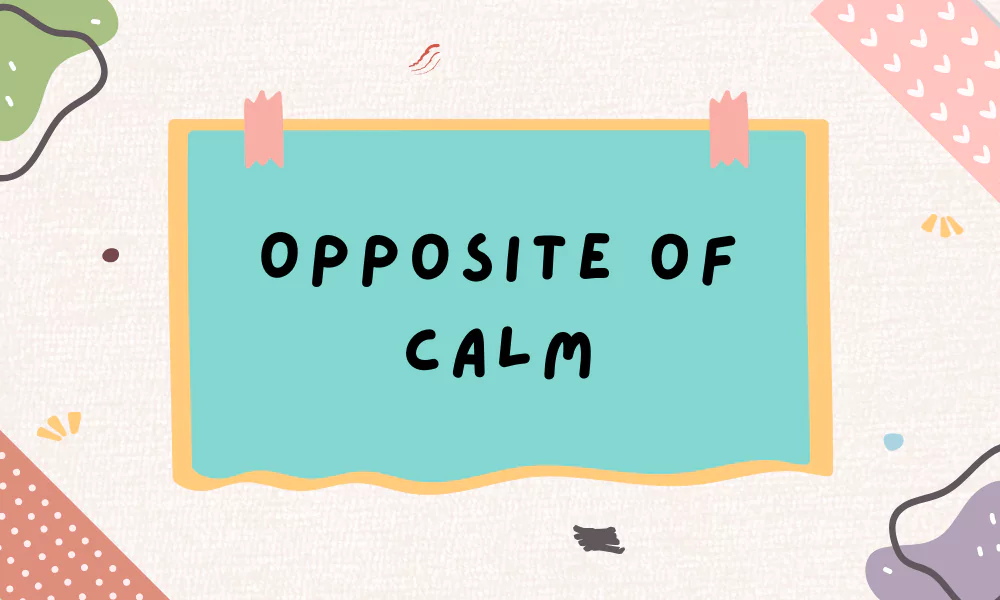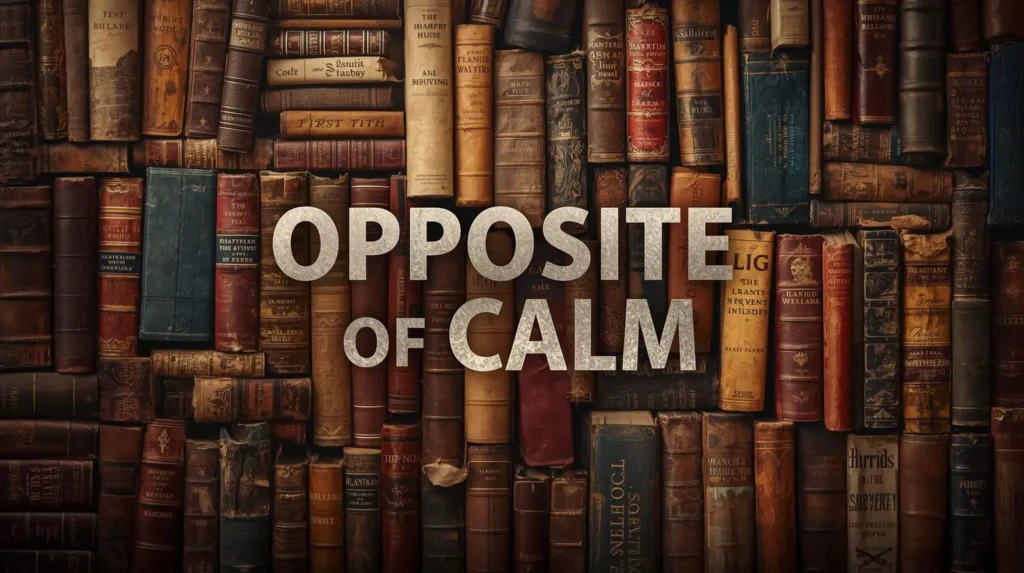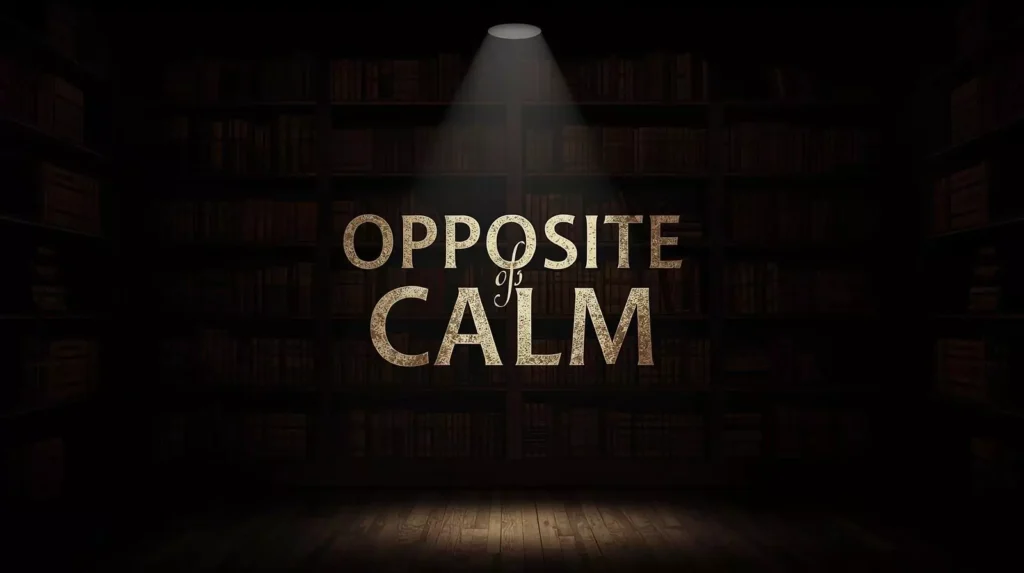Opposite of Calm – Antonyms, Meanings, and Examples

The word “calm” describes a state of peace, ease, and stillness whether it’s a quiet moment, a serene place, or a person who remains composed under pressure. However, not everything in life is calm. At times, situations can become tense, noisy, or full of strong emotions, and that’s when we turn to the antonyms of calm. Words like anxious, restless, agitated, nervous, and chaotic capture the very opposite of calm, describing moments of unease, disorder, or heightened energy. Learning both the synonyms and antonyms of a word not only expands our vocabulary but also helps us express ourselves more clearly in daily conversations, writing, and beyond.
Meaning of Calm
Calm refers to a state of peace, quietness, and emotional steadiness. It describes situations where there is no disturbance, stress, or chaos. A calm person is composed, not easily upset or excited, while a calm setting feels serene and comforting. In short, calm is the balance that brings clarity, comfort, and stability.

Why Knowing the Opposite of Calm Matters
Understanding the antonyms of calm can helps us describe experiences more precisely. Language becomes richer when we know both sides of a word’s meaning. By recognizing what calm is not, we can better express emotions, handle stressful situations, and choose the right words in writing or conversation. Learning opposites not only broadens vocabulary but also sharpens our ability to communicate feelings and states of mind effectively.
Antonyms of Calm with Meaning And Example
| Antonyms | Meaning | Example |
|---|---|---|
| Agitated | feeling troubled or disturbed | She looked agitated after hearing the unexpected news. |
| Restless | unable to stay still or relaxed | The child grew restless during the long journey. |
| Chaotic | full of confusion and disorder | The classroom became chaotic when the teacher left. |
| Anxious | feeling nervous or worried | He was anxious before his big presentation. |
| Tense | stretched tight, emotionally or physically strained | The tense atmosphere made it hard to concentrate. |
| Excited | full of strong emotions or energy | The kids were too excited to sleep before the trip. |
| Uneasy | lacking comfort, feeling unsettled | She felt uneasy walking alone at night. |
| Noisy | loud and disturbing | The noisy street made it hard to relax. |
| Stressed | under pressure or strain | He was stressed about meeting the deadline. |
| Disturbed | troubled or interrupted from peace | The meditation was disturbed by sudden loud music. |
| Wild | uncontrolled or untamed | The wild crowd cheered loudly in the stadium. |
| Irritated | easily annoyed or provoked | She was irritated by the constant interruptions. |
| Disorderly | lacking organization or control | The disorderly protest blocked the roads. |
| Emotional | strongly affected by feelings | He became emotional after watching the movie. |
| Frenzied | wildly excited or uncontrolled | The crowd grew frenzied during the concert. |
Emotional Antonyms of Calm
- Anxious – worried or uneasy.
Example: She was anxious about her exam results. - Nervous – easily agitated or tense.
Example: He felt nervous before his first performance. - Irritated – annoyed or disturbed.
Example: The constant noise made him irritated. - Stressed – pressured or overwhelmed.
Example: He felt stressed about his workload. - Restless – unable to relax emotionally.
Example: She grew restless waiting for the call. - Agitated – emotionally disturbed or shaken.
Example: His agitated voice revealed his frustration. - Tense – emotionally strained.
Example: The tense silence filled the room. - Excited – full of strong feelings, often too much to stay calm.
Example: The children were excited about the festival. - Uneasy – uncomfortable in mind.
Example: He felt uneasy in the dark alley. - Emotional – strongly moved by feelings.
Example: She grew emotional while sharing her story.
Behavioral Antonyms of Calm
- Chaotic – behaving in disorder.
Example: His chaotic actions confused everyone. - Reckless – careless and wild.
Example: He drove in a reckless manner through the city. - Aggressive – forceful, hostile behavior.
Example: The aggressive player was penalized for foul play. - Rowdy – noisy and disorderly.
Example: The rowdy group disrupted the meeting. - Impatient – unable to wait calmly.
Example: She grew impatient in the long queue. - Disorderly – lacking control in behavior.
Example: The disorderly students were sent out of class. - Frenzied – acting in wild excitement.
Example: The frenzied shoppers rushed into the store. - Boisterous – loud, energetic, and unruly.
Example: The boisterous kids played in the park. - Irrational – behaving without reason or calmness.
Example: His irrational anger surprised everyone. - Hysterical – overly emotional or uncontrollable behavior.
Example: She became hysterical after hearing the shocking news.
Environmental Antonyms of Calm
- Noisy – filled with disturbing sounds.
Example: The noisy traffic made studying difficult. - Stormy – marked by violent weather.
Example: The stormy night kept everyone awake. - Chaotic – full of disorder and confusion.
Example: The chaotic marketplace was overwhelming. - Turbulent – rough or disturbed, often with motion.
Example: The plane faced turbulent weather mid-flight. - Busy – full of activity and movement.
Example: The busy city never sleeps. - Crowded – packed with people or objects.
Example: The crowded subway was hard to navigate. - Loud – producing high volume of sound.
Example: The loud concert echoed through the streets. - Disturbing – causing interruption or discomfort.
Example: The disturbing noise came from the construction site. - Wild – untamed and uncontrolled.
Example: The wild ocean waves crashed against the rocks. - Unsettled – not stable or peaceful.
Example: The unsettled weather delayed the trip.
Usage Rules for Antonyms of Calm
- Match context carefully – Some antonyms are emotional (anxious, nervous), some are behavioral (rowdy, aggressive), and some are environmental (noisy, turbulent).
- Use correct intensity – Words like frenzied or chaotic are stronger than restless or uneasy. Choose based on how extreme the situation is.
- Avoid redundancy – Don’t pair antonyms unnecessarily (e.g., “restless and uneasy” together may sound repetitive).
- Maintain tone – In formal writing, prefer words like tense, disturbed; in casual speech, rowdy, restless might work better.
- Be precise – Use noisy for sound, turbulent for motion, stressed for feelings.
Common Mistakes When Using Antonyms of Calm
- Using a negative form instead of a true antonym (e.g., “not calm” instead of restless or agitated).
- Mixing emotional and environmental antonyms incorrectly (e.g., “The weather was anxious” – anxiety describes people, not weather).
- Overusing strong antonyms in mild situations (e.g., calling a slightly busy café “chaotic”).
- Confusing similar terms (e.g., nervous vs. anxious – both mean uneasy but anxious suggests stronger worry).

Antonyms of Calm Quiz
Choose the correct antonym of “calm” in each sentence:
- The baby became ___ when he didn’t get his toy.
a) serene
b) restless
c) peaceful - The sea turned ___ during the storm.
a) turbulent
b) still
c) quiet - She felt ___ before her exam.
a) anxious
b) relaxed
c) tranquil - The ___ students made it hard for the teacher to continue.
a) boisterous
b) composed
c) gentle - His voice sounded ___ after the heated argument.
a) agitated
b) calm
c) soft - The crowd went ___ when the singer appeared on stage.
a) frenzied
b) peaceful
c) silent - He looked ___ waiting in the dark alley.
a) uneasy
b) serene
c) cheerful - The marketplace was ___ with shouting vendors.
a) chaotic
b) calm
c) tranquil - She grew ___ while standing in the long queue.
a) impatient
b) patient
c) relaxed - The ___ weather delayed the flight.
a) unsettled
b) peaceful
c) still
Read: EYP Meaning
FAQs
Conclusion
The word calm reflects peace, stillness, and emotional stability but life isn’t always calm. At times, we experience its opposites: stress, noise, disorder, and agitation. Learning the antonyms of calm not only improves vocabulary but also helps in expressing emotions, behaviors, and environments more accurately. Whether you’re describing an anxious mind, a restless crowd, or a chaotic situation, knowing the right opposite word adds clarity and depth to your communication. By practicing these antonyms in daily conversations and writing, you’ll strengthen both your language skills and your ability to describe the world around you.
